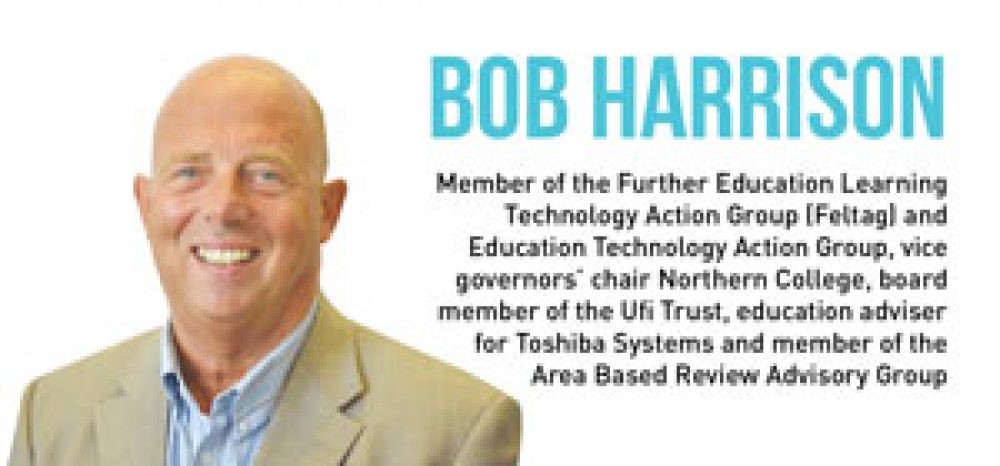Bob Harrison considers the role of technology in post-16 education area-based reviews.
Why is everyone so twitchy now Skills Minister Nick Boles has announced a process which some feel is not only hasty, but fundamentally flawed and is merely being used as a thin cloak for the cuts expected in the next comprehensive spending review?
The pace of the reviews in Sheffield, Manchester and Birmingham has already begun to raise questions about ‘opportunity cost’ and a worry that all the effort will detract from the quality of teaching and learning. A particular concern repeatedly voiced by the National Union of Students is ‘What about students? Don’t they get a say in this?’
Technology-enhanced learning, blended learning and online learning feature prominently in the criteria the reviews should consider when making recommendations about future provision.
Others however feel the reviews are long overdue and the FE sector needs radical reform of the funding and assets with a much closer alignment of provision to the future needs of learners and employers. This also, coincidentally, fits neatly into the government’s plans for devolution to the regions.
Some groups such as the Sixth Form Colleges’ Association and others are dumbfounded that the process is going ahead when school sixth forms, University Technical Colleges and free schools are excluded from the process.
There is big money at stake with an FE and skills budget of over £7bn up for grabs which the devolved regions, and the local enterprise partnerships (Leps), would dearly like to get control of.
There is a tension between the needs and aspirations of learners and the needs of employers. They can, and often do, align but they may not.
The long history and evolution of further and adult education does not neatly fit into lines drawn on a map. Lep regions do not always map easily to areas of economic development and travel to work areas not to mention the hopes and dreams of individuals and communities?
It is a constantly shifting dynamic which extends beyond county and country borders and cannot easily be mapped and managed but the Minister and the FE and Sixth Form Commissioners are anxious to get the process underway and are cracking on.
The Area Based Review Advisory group (ABRAG) has issued guidance for the local steering groups. Technology-enhanced learning, blended learning and online learning feature prominently in the criteria the reviews should consider when making recommendations about future provision.
This will mean a realignment of the current assets of the FE sector from the predominantly analogue delivery model based on land and buildings to one fit for a digital future.
It will also mean a reinvestment of some of those realised capital assets into wireless and digital infrastructure and critically enhanced workforce skills to support learning and assessment in a digital age. It could mean we will need more teachers but with a different skillset?
This does not mean face to face learning will disappear but hopefully a more balanced ‘blend’ of learning will emerge which will be more flexible and responsive to learner and employer needs.
This time we really do need a ‘paradigm shift’ in thinking about how learning programmes are designed, delivered and assessed.
All of these area-based deliberations are set in a context of drastic cuts to the FE budget and if we have learned anything about technology enhanced, online and blended learning it is that it is not a cheap option. While the predominant view of the misinformed is that ‘online equals cheaper’ history teaches us that any realignment of learning vision, leadership, culture, design, methodology, pedagogy and assessment will need considerable upfront investment in infrastructure and human resources.
That is why the emergent lessons from the first reviews are essential for Leps, teachers, managers, principals, governors, work-based learning providers, assessors and policy makers.



Sadly due to word count this intro para had to be cut….I think it is important context to the piece
Further and Adult Education has a proud and distinguished history of adaptability and agility to respond to the changing needs of learners, society and employers. The roots of our sector are deeply entwined in the aspirations of working men and women who wanted a better education, improved skills and life chances for themselves, their children and their communities.
A College in Derbyshire I worked at was built by the proceeds from the Miners “penny levy” a tin at the top of the mineshaft where Miners would drop a penny on pay day until there was enough money to build a humble 2 storey redbrick building to teach their children to read and write during the day and themselves and their families in the evening.
The growth of “The Peoples Colleges” was the foundation of technical and vocational education and the formation of some Universities. Another College where I worked, The Peoples College in Nottingham, was “erected by voluntary contribution for the education and training of the working class forever”.